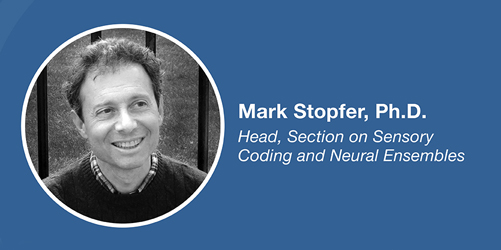 How did you become interested in science and research?
How did you become interested in science and research?
Somehow, I never lost my childhood fascination with understanding how things work and with trying to figure things out for myself. In college, I discovered that I enjoyed every part of doing laboratory research. I was struck by the realization that our perception of the world is a construction of the brain, a structure surrounded by fluid and encased in bone that receives only electrical and chemical signals about the environment around us. I still can’t imagine anything more interesting than studying how this works. And I think I’m incredibly lucky to be able to make a living this way.
What brought you to NICHD?
NIH’s high-risk, high-reward approach really appealed to me. I don’t like to nibble around the edges of scientific problems. NICHD offered the opportunity to tackle difficult and interesting questions in ways that are hard to accomplish in other environments.
What types of training, experiences, or traits are essential for success in your position?
Technical training is important, of course, but maybe equally important is having lots of opportunities to interact with smart people who will push you to sharpen your thinking and get your facts right.
What do you find most valuable about working at NICHD?
NICHD provides so many wonderful resources for scientists. The most valuable are the people working hard to enable great science and to train the next generation.
What is your favorite research finding out of everything you have worked on?
Sometimes, when my group finishes a project I think, “Wow! I can’t think of another laboratory that would have asked this question or approached it this way.” Those are the projects I tend to feel most proud about because we’ve contributed something unique to the world.
What advice can you offer to people who are at an earlier stage of their career?
I would advise young scientists to know themselves—find out what kind of work you really like to do, what you’re good at, and what you find satisfying. Knowing this requires trying different things and being open to new experiences. And then, whatever you choose to do, do it well.
Return to Get to Know NICHD.
 BACK TO TOP
BACK TO TOP